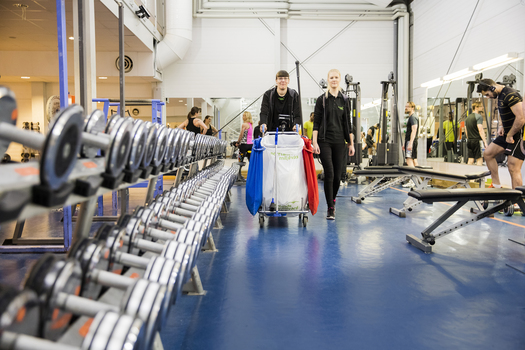by Brianna Crandall — August 5, 2016 — A study by SCA and its global hygiene brand Tork investigates how the Internet of Things (IoT) impacts work by cleaners and facilities managers. The results show increased quality and efficiency in combination with reduced stress among cleaners. The study is based on Tork EasyCube, an IoT-based service that provides real-time information about cleaning and refill needs.
The Internet of Things is often referred to as a phenomenon for the future. Yet, early solutions already exist for the cleaning industry. One example is Tork EasyCube — a digital service with connected devices that provide cleaners with mobile access to real-time information about cleaning and refill needs.

Tork EasyCube digital service with connected devices provides cleaners with mobile access to real-time information about cleaning and refill needs at IKSU Sport in Sweden.
To investigate changes in ways of working, Tork carried out a before and after study of Tork EasyCube, based on observational studies complemented by data from the system. The study was executed by ScandInfo on commission by SCA, comparing data from March 2015 and March 2016.
The study was conducted at IKSU Sport, considered northern Europe’s largest sports facility, in Umeå, Sweden, a 236,000 sq. ft. facility with 1,500,000 yearly visitors and a team of 30 cleaners. In total, 300 connected dispensers were implemented in washrooms, changing rooms, gyms, sports halls and other areas.
The results show a new logic for cleaning, says Tork. Instead of static cleaning rounds, the team has shifted to need-based cleaning, resulting in increased efficiency. Knowing in real time what is needed, when and where has enabled the team to reduce dispenser controls by 77%.
These kinds of effects have also made it possible to reallocate cleaning activities to where they matter most to achieve a noticeably higher quality, notes Tork. Although complaints about cleaning quality and empty dispensers previously occurred with frequency, now with the IoT-based service they do not occur at all. The study also shows a boost in staff’s motivation thanks to increased control, less stress and more focus on what matters most.
André Söderberg, cleaner working at IKSU, commented:
The system makes the job more dynamic and meaningful, I feel like I have the energy to do more when I know that everything I do matters.
Key results:
- Shifting from static to need-based cleaning: The Tork EasyCube service has enabled the cleaning teams to work in new ways, and to shift from static cleaning rounds to need-based cleaning, leading to double-digit improvements across efficiency and quality.
- Unnecessary work reduced: Instead of running back and forth to physically check if a dispenser needs a refill, cleaners now know in real time what to do. Before, only one out of four dispenser controls led to a refill, but after the implementation, seven out of 10 dispenser controls are motivated by a refill. The total number of dispenser controls has also been reduced by 77%, saving valuable time and work for the cleaners.
- Increased amount of actual cleaning activities: No time wasted has freed up time that can be focused on additional and more thorough cleaning with a direct impact on quality — especially in frequently used areas, where cleaning activities have increased by 62%.
- Reduced time with empty dispensers: The time during which dispensers are out of or almost out of refills has been reduced by 76%, and in critical areas with the most visitors, the same figure is 88%, with a direct impact on washroom quality.
- No complaints: Before the implementation of Tork EasyCube, cleaning was a major problem area, with frequent complaints. With the system in place, and the shift from static to need-based cleaning, complaints about cleaning have been completely eliminated.
- Smoother hand-over between shifts: Better overview and no time wasted makes it easier to finish tasks on time, handing over facilities in better shape to the next shift, which removes the risk of conflicts and frustration.
- Refined planning and staff allocation: With insights from the system, the management team has been able to make new decisions, including charting and comparing monthly needs to more efficiently allocate resources over the year. As a result, staffing hours will be shifted from the winter period to the fall and spring, which require more intense cleaning.
- Higher sense of meaningfulness among staff: The study shows increased pride among the cleaners, and tasks that used to be repetitive and dull feel meaningful when adapted in real time to exactly what is needed. The cleaners feel more in control and less stressed, while at the same time being more effective. This has also resulted in reduced sick leave.
- Easier to attract and train new staff: Being able to work with the support of the system has been an attractive benefit to recruit new staff, and the training time for new cleaners has radically decreased. They can start working and become part of the team right away.
Bo Andersson, property manager and head of facility management at IKSU, pointed out:
I had underestimated what can be done with this system. Before Tork EasyCube was implemented, our management team was considering building new changing rooms to solve the cleaning quality problem, which would have cost millions. Now that money can be used more efficiently, and we’re already thinking about how to take the next step.





